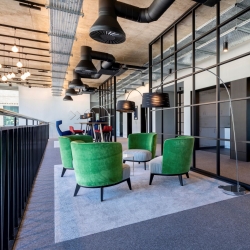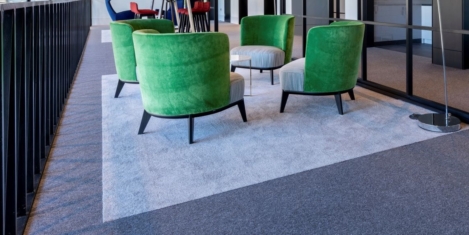To provide the best experiences, we use technologies like cookies to store and/or access device information. Consenting to these technologies will allow us to process data such as browsing behaviour or unique IDs on this site. Not consenting or withdrawing consent, may adversely affect certain features and functions.
The technical storage or access is strictly necessary for the legitimate purpose of enabling the use of a specific service explicitly requested by the subscriber or user, or for the sole purpose of carrying out the transmission of a communication over an electronic communications network.
The technical storage or access is necessary for the legitimate purpose of storing preferences that are not requested by the subscriber or user.
The technical storage or access that is used exclusively for statistical purposes.
The technical storage or access that is used exclusively for anonymous statistical purposes. Without a subpoena, voluntary compliance on the part of your Internet Service Provider, or additional records from a third party, information stored or retrieved for this purpose alone cannot usually be used to identify you.
The technical storage or access is required to create user profiles to send advertising, or to track the user on a website or across several websites for similar marketing purposes.
 Workplace design and fit out company Area has become a founding member of Studio Alliance, a formal group of workplace experts who share common values, ethics and goals when delivering projects across Europe. Studio Alliance has been formed in response to accelerating globalisation and offers corporate occupiers and landlords local market knowledge combined with the experience of designing and delivering projects in over 5,000 buildings throughout 24 countries. (more…)
Workplace design and fit out company Area has become a founding member of Studio Alliance, a formal group of workplace experts who share common values, ethics and goals when delivering projects across Europe. Studio Alliance has been formed in response to accelerating globalisation and offers corporate occupiers and landlords local market knowledge combined with the experience of designing and delivering projects in over 5,000 buildings throughout 24 countries. (more…)






 Companies are facing complex performance challenges as the COVID-19 resurgence heightens the need to reinvigorate employee engagement.
Companies are facing complex performance challenges as the COVID-19 resurgence heightens the need to reinvigorate employee engagement. 
 Men, younger people, and those with conservative political views are less likely to comply with Covid-19 measures such as social distancing, claims new research from
Men, younger people, and those with conservative political views are less likely to comply with Covid-19 measures such as social distancing, claims new research from 
 Employees facing increased job and financial insecurity at the onset of the pandemic suffered a wave of mental distress, according to research published by the
Employees facing increased job and financial insecurity at the onset of the pandemic suffered a wave of mental distress, according to research published by the 
 In the
In the 
 GlobalWebIndex (GWI), together with LinkedIn’s B2B Institute, has launched “
GlobalWebIndex (GWI), together with LinkedIn’s B2B Institute, has launched “
 The construction sector, the real estate industry and city planners must give high priority to the same goal – to drastically reduce their climate impacts. Powerful, combined efforts across all of the built environment sectors are absolutely crucial for the potential to achieve the UN’s sustainability goals. And what’s more – everything has to happen very quickly. These are the cornerstones to a roadmap presented at the recent
The construction sector, the real estate industry and city planners must give high priority to the same goal – to drastically reduce their climate impacts. Powerful, combined efforts across all of the built environment sectors are absolutely crucial for the potential to achieve the UN’s sustainability goals. And what’s more – everything has to happen very quickly. These are the cornerstones to a roadmap presented at the recent 


 New research published by
New research published by 


 The pace of deterioration in UK job prospects is starting to slow this autumn due to very modest improvements in planned recruitment activity and a slight decrease in employers’ intentions to make redundancies. This is according to the latest quarterly
The pace of deterioration in UK job prospects is starting to slow this autumn due to very modest improvements in planned recruitment activity and a slight decrease in employers’ intentions to make redundancies. This is according to the latest quarterly 







November 19, 2020
Covid-19 is levelling the playing field for disabled workers
by Ruby Gullon • Comment, Flexible working, Wellbeing